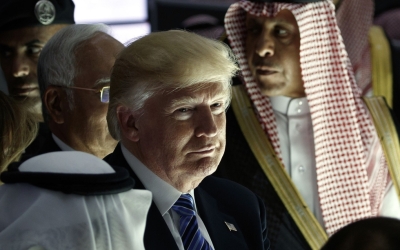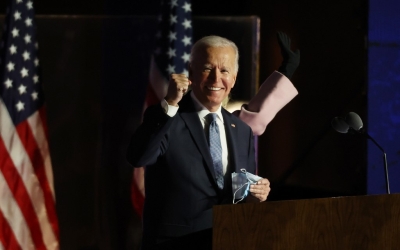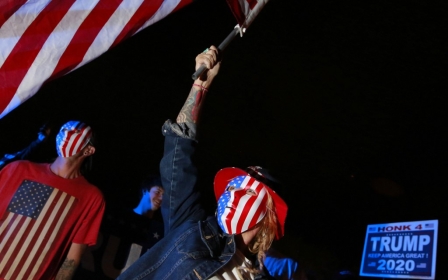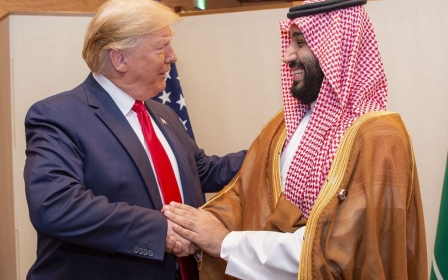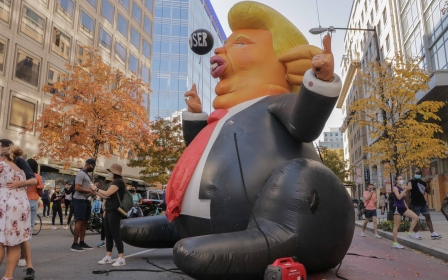Politics and flavoured tobacco: Arab Americans are relieved at Trump's defeat

It's a "beautiful thing" that US President Donald Trump will be gone, said Mohamad Alshoeebi as he took a long puff on his hookah at a cafe in a predominantly Arab neighbourhood in Dearborn, Michigan.
"A lot of people suffered over the past four years," said Alshoeebi, who is ancestrally from Yemen. "We hope the future will be better under Biden."
According to the 26-year-old, Trump's time in office was defined by chaos and racism. "At the end of the day, America is for everyone," he said.
Hookah bars are an integral part of the socialising culture in Dearborn, a Detroit suburb known as the capital of Arab America for its large Middle Eastern community.
The electorate in the city overwhelmingly favoured Joe Biden, giving the Democratic candidate a 17,000-vote advantage that helped him capture Michigan.
New MEE newsletter: Jerusalem Dispatch
Sign up to get the latest insights and analysis on Israel-Palestine, alongside Turkey Unpacked and other MEE newsletters
At Dearborn's Mango's Cafe on Saturday night, many patrons expressed relief at Trump's looming departure from the White House.
'Youssef Baydoun'
With songs by iconic Lebanese singer Fairuz playing in the background and the smell of flavoured tobacco filling the air, the cafe was packed by groups of people of all ages who sipped tea and coffee until the early morning hours.
"I'm happy," said Anjad Bazzi, 41. "The most important thing is that we got rid of Trump. He is racist. If he could strip us of our citizenships and deport us, he would have done it."
She added that she hoped Biden would live up to his promises of combating bigotry and xenophobia.
"This other guy, we still have not seen his good nor evil," Bazzi's friend, Rania Jallad, interjected about Biden. She added that the new administration should "leave Lebanon alone," referring to Trump's sanctions against Lebanese officials and companies.
Still, Bazzi said she was optimistic about the president-elect. She drew a contrast between him and the current president, saying she admires Biden's character before describing Trump as a "fool".
She said one of the campaign events that left her especially appalled was when Trump tried to shame Biden over his son's drug abuse on the debate stage last month.
"I hated that. People have problems. The president should not speak like that," Bazzi said.
Bazzi, who hails from the southern Lebanese town of Bint Jbeil, joked that she may be related to the president-elect, calling him Youssef Baydoun.
The Baydoun's are a prominent Bint Jbeil family with thousands of members in Dearborn. Many in the Arab-American community enjoy referring to the president-elect as Youssef Baydoun.
In his first speech as president-elect, Biden vowed to tackle systemic racism and focus on combating the spread of the coronavirus.
"Americans called upon us to marshal the forces of decency, the forces of fairness, the forces of science and the forces of hope in the great battles of our time," Biden said on Saturday night.
He specifically cited "the battle to control the virus, the battle to build prosperity, the battle to secure your family's health care, the battle to achieve racial justice and root out systemic racism in this country, and the battle to save our planet by getting the climate under control."
Kat, an African-American Detroiter who lives in Tennessee, said racism became "way worse" under Trump - something she witnessed in her daily interactions with people in the conservative southern states.
"It was a little frightening," Kat, who wished to be identified by her first name only, told MEE.
She said the first item on Biden's agenda should be race relations. "That's the only way that we are going to get ahead - it's if we start working together."
On the economy
While many Americans danced in the street after the results were announced on Saturday, in Dearborn some people voiced support for the outgoing president. Fadi Yaldo, an Iraqi American who owns gas stations, said Trump's years saw an uptick in prosperity until the coronavirus hit.
"Biden is going to tax the hell out of us," Yaldo said. "It's not about Trump or Biden, it's about what's going to happen to the economy."
He also defended Trump against accusations of bigotry and Islamophobia. "I don't think he's against Muslims; he's against terrorism."
Sam Najem, 27, was in agreement that Trump was good for the economy, but said that he voted for Biden.
"He was terrible to immigrants," Najem said of Trump. "I voted blue, Biden; my family is Iraqi, and Trump is kind of racist."
Unemployment had dipped to historic lows in Trump's first three years in office, but Democrats argue that the economy was on an upward trajectory from the previous eight years under President Barack Obama.
Trump's critics also say that his tax cuts benefited billionaires while depriving the Treasury of money needed for social programmes that benefit the poor. Biden has vowed not to raise taxes on people who make less than $400,000 a year.
Still, the notion that Trump was good for the economy appears prevalent in Dearborn, a community where many people own small businesses.
Khadr Zaarour, a Lebanese-American political organiser from North Carolina who visits Dearborn regularly to socialise within the Arab community, said he was a Republican until 2000, when the GOP became "too extreme".
"People voted for Trump, they ended up paying for it. We have more debt now than we did before. We have more enemies than we did before. We have to dig ourselves out of the hole. For the next four years, Biden is basically going to be a janitor cleaning up the mess."
From an Arab-American perspective, Zaarour said Trump brought to the surface a lot of "trash" that had been kept out of the public eye, particularly the covert relationship between some Arab governments and Israel.
"We knew they were doing a lot of backchannels with the Israeli government, which was a betrayal of the Arab cause, especially the Palestinians," he told MEE. "Trump exposed that, and that was needed... We were kind of shy about attacking Arab leaders. Now we should not be shy. They are the enemy."
On foreign policy
The Trump administration brokered normalisation deals between Israel and the governments of Bahrain and the United Arab Emirates and announced a third pact in the works between Sudan and the Israeli government.
His supporters portrayed the agreements as major breakthroughs for peace, even though the recently normalising Arab countries were never actually at war with Israel.
Trump also moved the US embassy to Jerusalem and put forth a peace plan that would enable Israel's annexation of large parts of the occupied West Bank.
Biden is a staunch Israel supporter, but has vowed to undo some of Trump's policies against Palestinians, pledging to restore funding to the UN refugee agency for Palestinian refugees, UNRWA, and to open a consulate for Palestinians in East Jerusalem.
However, the president-elect has said he would not return the embassy to Tel Aviv.
Joseph Ahmad, 29, said he was pleased "Trump's racism" was defeated, but his expectations for Biden were low. "They say they're going to do this or that for the Middle East; in the end, it will all be about Israel."
Souzanna Roumi, a waitress at the hookah cafe, said the election was a "lose-lose situation" for Arabs who care about Palestine and foreign policy, citing Biden's hawkish record and support for the war in Iraq.
"Trump is very racist and he was going to continue the annexation of Palestine," she told MEE. "I feel like the only reason Arabs voted for Biden is because he was the lesser of two evils."
Palestinian-American comedian Amer Zahr, a regular at the hookah bar, had been critical of the Biden campaign's stance on Palestine. Still, eventually he said he would begrudgingly vote for the Democratic candidate, comparing his decision with that of a Muslim deciding to eat ham in the desert if no other food was available.
Zahr said while he understands people's "relief" that Trump is gone, he was worried that the new administration may sideline Arab Americans and progressives who helped elect Biden.
"The question for me is whether or not our community views this as the beginning of a process or the end of a process," he told MEE.
"If you view it as the end of a process, you're wrong. If you view it as the beginning of a process to try to reform some things and get what we can out of Biden, then I'm with you. Let's see what we can do. But I'm not too optimistic, especially when it comes to Palestine."
Middle East Eye delivers independent and unrivalled coverage and analysis of the Middle East, North Africa and beyond. To learn more about republishing this content and the associated fees, please fill out this form. More about MEE can be found here.


